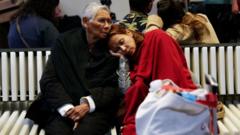The deadly attack on Aboubakar Cissé during prayer has ignited criticism of officials for their initial handling of the incident, with debates centering on the implications of this tragedy for Muslim communities in France.
Fatal Mosque Stabbing Sparks Outcry Over Muslim Safety in France

Fatal Mosque Stabbing Sparks Outcry Over Muslim Safety in France
A brutal murder of a young Muslim man in a French mosque raises questions about government response to hate crimes.
The tragic stabbing of 21-year-old Aboubakar Cissé in a La Grand-Combe mosque has ignited a wave of outrage regarding the safety of Muslims in France. Cissé, originally from Mali, was attacked while engaged in prayer, receiving multiple stab wounds that led to his death.
The incident raises troubling concerns over the official response, as local prosecutors initially appeared to downplay the severity by suggesting the attack could have stemmed from a personal dispute with another worshipper. However, subsequent comments by prosecutor Abdelkrim Grini indicated a pivot towards considering the act as a potential hate crime, with possible anti-Muslim motivations now under investigation.
The accused, a Bosnian-origin French national born in 2004, filmed a disturbing video of the aftermath while hurling insults at Allah, provoking further scrutiny on his intentions. He fled to Italy but later surrendered to authorities in Pistoia. Although he remains unidentified and has not been charged, the legal process for extradition back to France could be protracted, with many fearing a lack of timely justice for the victim.
The brutal nature of the crime underscores the pressing need for a societal reassessment of how hate crimes are acknowledged and responded to within France’s diverse communities, particularly in light of this incident's implications for Muslim safety and acceptance.




















